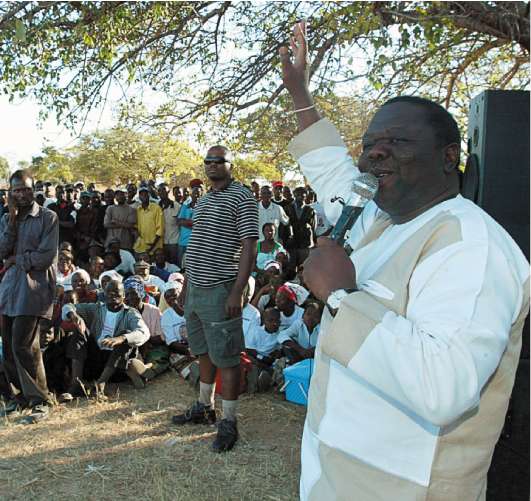Unity government talks offer hope to Zimbabwe

Your support helps us to tell the story
From reproductive rights to climate change to Big Tech, The Independent is on the ground when the story is developing. Whether it's investigating the financials of Elon Musk's pro-Trump PAC or producing our latest documentary, 'The A Word', which shines a light on the American women fighting for reproductive rights, we know how important it is to parse out the facts from the messaging.
At such a critical moment in US history, we need reporters on the ground. Your donation allows us to keep sending journalists to speak to both sides of the story.
The Independent is trusted by Americans across the entire political spectrum. And unlike many other quality news outlets, we choose not to lock Americans out of our reporting and analysis with paywalls. We believe quality journalism should be available to everyone, paid for by those who can afford it.
Your support makes all the difference.Emergency talks have begun between the Zimbabwean government and opposition, suggesting that leading figures on both sides may be ready to accept that the presidential run-off on 27 June cannot bring peace to the country.
The existence of the negotiations is officially denied by all sides, including the South African mediators. But the talks are sufficiently advanced for a second meeting to have been scheduled for this week between the ruling Zanu-PF and opposition Movement for Democratic Change.
Morgan Tsvangirai, leader of the .MDC, remained publicly combative at a press conference in Harare yesterday, ruling out any deals before the polls. "The MDC is focused on the run-off, our victory is certain. The issue of a government of national unity before the run-off does not arise," he said.
It is understood that the first meeting in the most recent talks process took place in Pretoria on 30 May. Zanu-PF was represented by the Justice Minister, Patrick Chinamasa, and the Social Minister, Nicholas Goche. South Africa's Local Government Minister, Sydney Mufamadi, chaired the meeting and the MDC sent its secretary-general, Tendai Biti, and deputy treasurer Elton Mangoma. The MDC's breakaway wing sent its secretary-general, Welshman Ncube.
A key player in bringing both sides to the table is believed to be the former Zimbabwean finance minister Simba Makoni – a rebel candidate from the ruling party who came third in the first round on 29 March. Mr Makoni confirmed that both sides were talking and that the framework for some form of transitional government was on the table.
But Mr Makoni – who is not a formal player in the talks – is also pressing both sides to go further than either is willing to go, for the moment. He believes the 27 June run-off should be cancelled. "This election should be averted because it will not solve the problem that the country is facing. Neither Zanu-PF nor the MDC is going to be able to govern effectively after this run-off because the economy is at a standstill and the population is traumatised," he said.
It is understood the talks have touched on the idea of the run-off being cancelled and President Robert Mugabe remaining head of state with Mr Tsvangirai as prime minister. Such a scenario – which was described by a source yesterday as "only a first negotiating position" – would allow Mr Mugabe and Mr Tsvangirai, who both fear they may lose the run-off, to save face.
It is believed that the South African President Thabo Mbeki – who since last year has acted as a mediator on behalf of the Southern African Development Community (SADC) – did not meet the parties. Mr Mbeki's impartiality has been called into question by the Zimbabwean opposition and the MDC has asked him to step down.
Even though that has not happened, it does appear that the broader leadership of SADC, currently chaired by Zambia, has begun to take a more proactive role.
At the weekend, the founding president of Zambia, Kenneth Kaunda, who is close to Mr Mugabe, called on him to form a government of national unity with Mr Tsvangirai as prime minister. "The authority between president and prime minister must be fairly shared," said Mr Kaunda.
Join our commenting forum
Join thought-provoking conversations, follow other Independent readers and see their replies
Comments